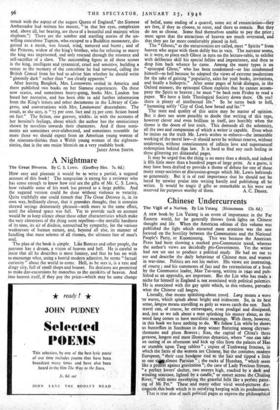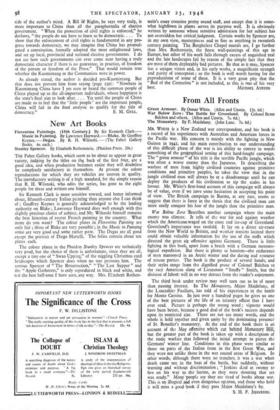Chinese Undercurrents
The vigil of a Nation. By Lin Yutang. (Heinemann. 12s. 6d.) A NEW book by Lin Yutang is an event of importance in the Far Eastern world, for he generally throws fresh lights on Chinese thought and life. When the American edition of this volume was published the light which attracted most attention was the one focused on the hostility between the Communists and the National People's Party, or Kuomintang. This was because the American Press had been showing a marked pro-Communist trend, whereas the author's views are decidedly pro-Government. Yet the writer had not set out to produce a political study. He had set out to see and describe the daily behaviour of Chinese men, and women in war-time. Politics are not his métier. His views are interesting, of course ; and his statements of fact and the retranslation of a book by the Communist leader, Mao Tse-tung, written in 1940 and pub- lished as an appendix are important. But the Lin who has made a- niche for himself in England is not associated with political polemics. He is associated with the gay spirit which, in this volume, pervades what the Chinese call langyu.
Literally, that means splashing-about travel. Lang means a wave *or waves, which splash about bright and iridescent. So, in its best sense, langyu means travelling as gaily as waves catch the sun. Such travel can, of course, be extravagant, even prodigal and dissipated, and, just as we talk about a man splashing his money about, so the word lang comes to have moralistic meanings. With them, however, in this book we have nothing to do. We follow Lin while he shows us butterflies in Szechuan in deep winter fluttering among chrysan- themums and plum flowers ; Sian, the capital of China's three greatest, longest and most illustrious dynasties, where "one can take an outing of an afternoon and kick up tiles from the palaces of Han or stumble upon Tang tablets " ; copies of Tunhwang frescoes, in
which the faces of the women are Chinese, but the costumes modern European, "their cute headgear tied to the hair and tipped a little to one siggiglmost Parisian " ; the rocks of Huashan, "which seem
like a protelt against gravitation "; the cave of Lady Precious Stream "a perfect lovers' shelter, two storeys high, reached by a dark anei winding staircase, lighted by a candle," or sunset across the Chialing River, "with mists enveloping the graceful hills like a perfect paint- ing of Mi Fei." These and many other vivid word-pictures dis- tinguish this book which is in satisfying keeping with its predecessors. That is true also of such political pages as express the philosophical
side of the author's mind. A Bill -'8f Rights, be says very truly, is more important to China than all the .paraphernalia of elective government. "When the protection of civil rights is enforced," he declares, "the people do not have to learn to be democratic. . .. To show that the enforcement of civil rights is fundamental in any pro- gress towards democracy, we may imagine that China has promul- gated a constitution, formally adopted the most enlightened laws, and set up local, provincial and national elective governments. I do not see how such governments can ever come near having a truly democratic character if there is no guarantee, in practice, of freedom of the person or freedom of the Press." That would remain true whether the Kuomintang or the Communists were in power.
As already stated, the author is decided pro-Kuomintang. But that does not prevent him from saying (page 230): "Nowhere in Kuomintang China have I yet seen or heard the common people of China played up as the all-important individuals, whose happiness is the state's final aim to look after. . . . Yet until the people of China are made so to feel that the 'little people' are the important people, China will fail in the final analysis to qualify for the title of































 Previous page
Previous page